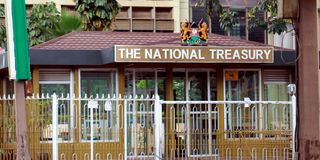
National Treasury Principal Secretary Chris Kiptoo when he appeared before the National Assembly Committee on Finance & National Planning at the Bunge Tower Nairobi on March 6, 2025.
National Treasury Principal Secretary Chris Kiptoo has revealed that by last week, the government had overshot its domestic borrowing limit approved by the National Assembly for the current financial year by Sh220 billion.
The admission by Dr Kiptoo before the Finance and National Planning Committee of the National Assembly exposes the government to expensive commercial loans and poses a risk of crowding out the private sector.
This is despite the PS’ assurance that the government intends to live within the Sh761 billion budget deficit for the current period approved by the National Assembly.

John Mbadi the Cabinet Secretary for National Treasury and Economic Planning.
“As of yesterday, we had borrowed Sh624 billion from the local market. This is due to delayed foreign financing,” Dr Kiptoo told the committee chaired by Molo MP Kimani Kuria on March 6. “We expect to live within our means; the approved deficit.”
The loans that the government procures locally are commercial in nature and tend to work against the lowering of public debt as they attract higher interests rate and their repayment periods are shorter.
Public debt
The main local lenders to the government are commercial banks, which own 45 per cent of the government securities, followed by pension funds at 32 per cent.
In the current financial year, the government had planned to borrow Sh263.2 billion from the local market. However, the domestic borrowing was increased by Sh141.4 billion following the rejection of Finance Bill, 2024 that had projected that the Kenya Revenue Authority would collect an additional Sh344.3 billion to finance the Sh3.992 trillion budget that was approved by the National Assembly.
The revelations by the PS go against the Treasury’s own commitment to minimise the costs and risks of public debt by mobilising resources mainly from multilateral and bilateral development partners.

The National Treasury Building in Nairobi.
“Commercial borrowing sources will be utilised as a last resort to fund the fiscal deficit and repay maturing external debts. Net domestic financing requirements will be met through the issuance of Treasury bonds in the domestic market,” the 2024 Budget Policy Statement (BPS) approved by Parliament states.
“More emphasis will be on maximising concessional loans while non-concessional borrowing will be limited to economic enabler projects that cannot secure concessional financing and are in line with the Bottom-Up Transformation Agenda of the government,” it adds.
The 2024 BPS shows that Kenya’s revenue as a percentage of GDP has been declining over the years, from 18.1 per cent in the financial year 2013/2014 to 14.3 per cent in the 2022/2023 period while expenditure has been rising, resulting in increased borrowing to bridge the revenue gap.
Increased borrowing
The Budget and Appropriation Committee of the National Assembly has on many occasions warned against increased borrowing from the local market. In its report on the supplementary budget I for the current financial year, it raised concerns when it emerged that the 91-day and 182-day Treasury bills (T-bills) rates had increased from 9.76 per cent to 16.68 per cent and 10.06 per cent to 16.86 percent, respectively.
The committee warned that additional borrowing from the domestic market could keep yields on the T-bills elevated.
“The committee noted that this may pose a risk of crowding out cheap credit to the private sector by the government as lenders may opt to lend more to the government compared to the private sector,” the report says. “This may negatively impact private investment, job creation and private-sector-led economic transformation.”
During the committee meeting, Baringo North MP Joseph Makilap noted that the lack of fiscal discipline by the Treasury had seen the government violate the approved ceilings.
“There is too much balancing at the National Treasury occasioned by over-projections on revenue. We borrow to pay debts,” said Mr Makilap.







